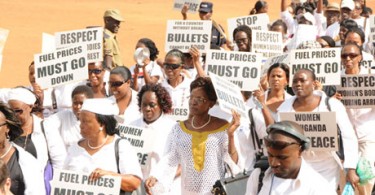This page is part of our special coverage Uganda: Walk to Work Protests [1].
The opposition groups in Uganda staged the famous walk to work protests [1]in April this year, which saw President Yoweri Museveni’s government unleash violence [2] against unarmed protestors. Ten Ugandans lost their lives mostly by bullets in the city protests.
Protests were about the rising fuel and food prices. After months of silence, the current economic situation which has worsened since April is seeing the opposition planning to re-launch walk to work protests.
On Wednesday August 10, 2011, members of the opposition under Activists for Change [3] held a rally in Masaka town where a 2-year-old girl was killed during the last protests. The police were quick to disperse the activists before opposition leader Dr. Kizza Besigye and other political figures could join the rally.
 [4]
[4]Ugandan women protesting against fuel and food prices in Kampala, Uganda. Photo courtesy of @vote4africa.
Hours after the protest began in Masaka, Uganda’s Minister for Security Muruli Mukasa told the media that protesters were terrorists [5]and that the Ugandan opposition is using Twitter, Facebook and YouTube to wage a campaign against the security forces and to “psychologically prepare the people, especially young people, for armed insurrection”.
Ugandans were quick to react on Twitter.
@IDEASUG said [6]social media is becoming more dangerous than terrorist groups:
@RosebellK [7] i love liberalization-free mkt econ. Social media is fast becomg more dangerous than terror gps…#Al [8]-socialmedia declared threat
@awetaka noted [9]that the fact that Uganda government officials don’t use social media shows their fears are about something they know nothing about.
@pjkanywa wondered [10] why government was quick to call protesters terrorists yet they have yet to put up a real trial for those who were behind the July 11, 2010 Kampala bombings that killed over 70 people.
@Opiaiya compared [11] the reaction of the UK government after London riots and the claims of Uganda government that ‘terrorist’ are using social media to prepare for war:
Social media worries in #Uganda [12] as former colony #Britain [13] mulls net crackdownhttp://bbc.in/qpMnn1 [14]
The opposition in Uganda uses social media better than the government [15]:
No doubt the Uganda opposition uses social media much better than the government. We have seen top opposition leaders updating their facebook and twitter accounts as they are in running battles with the police. But government’s reaction to social media has been slow ad hence they see the opposition having some good advantage in the race to put out information. I remember in April when the protests were on high, the presidential press secretary told the Guardian that they were not bothered about the impact of social media because “farmers in Uganda don’t know what it is.”
Last month, @dispatchug [16] produced a random pick of top 100 Twitter users in Uganda [17]. Most of them are professionals, politicians and citizen journalists who are interested in using the platform to further discussions on the state of the country. President Museveni’s Twitter account [18] has a little over 1,000 followers.
The Democratic Party leader and former presidential candidate Norbert Mao [19]also keeps his tweets flowing most of the day. He has about 900 followers. Other opposition figures like @AnneMugisha [20] from Forum for Democratic Change keep their Twitter and Facebook updates even during their running battles with the police.
The most popular opposition leader @KizzaBesigye [21] has more than 500 followers but has not been active for the last couple of months. His Facebook profile [22] is regularly updated.
Activists for Change [3] group has an active presence on Facebook [23] where many photos showing police brutality during the walk to work protests were posted.
This page is part of our special coverage Uganda: Walk to Work Protests [1].